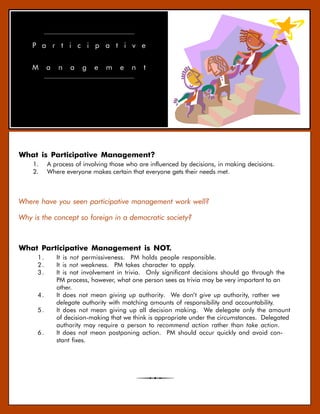
Participative management
- 1. P a r t i c i p a t i v e M a n a g e m e n t ( P M ) What is Participative Management? 1. A process of involving those who are influenced by decisions, in making decisions. 2. Where everyone makes certain that everyone gets their needs met. Where have you seen participative management work well? Why is the concept so foreign in a democratic society? What Participative Management is NOT. 1. It is not permissiveness. PM holds people responsible. 2. It is not weakness. PM takes character to apply. 3. It is not involvement in trivia. Only significant decisions should go through the PM process, however, what one person sees as trivia may be very important to an other. 4. It does not mean giving up authority. We don’t give up authority, rather we delegate authority with matching amounts of responsibility and accountability. 5. It does not mean giving up all decision making. We delegate only the amount of decision-making that we think is appropriate under the circumstances. Delegated authority may require a person to recommend action rather than take action. 6. It does not mean postponing action. PM should occur quickly and avoid con- stant fixes.
- 2. Sharing Authority through delegation Common response: “I’ll be darned if I’ll let my people make the decisions when I’m the one who is responsible for the operation. If it’s a bad decision, my head will roll, not theirs.” The Sharing (Delegating) Process: Responsibility + Authority + Accountability We Negotiate the Following Steps 1. Goals: We start with the end in mind. 2. Guidelines: We negotiate parameters, history, policies, boundaries, etc. 3. Resources: We negotiate the money, equipment, supplies, human resources, time, and authority available. 4. Accountability: We negotiate what information will be tracked, how, when, and to whom it will be reported. 5. Reward: Unless there are special spifs, bonuses, or incentives, rewards usually include good reviews, higher raises, greater opportunity for promotion, greater authority, etc. What is the difference between sharing and delegating authority? Skills Required for Participative Management 1. Interest and concern. Some people prefer to be told what to do. 2. Recognize and enhance talents in others. Some people fear they will lose power if they build others. 3. Recognize and work around weaknesses in others. Some people are so irritated by deficiencies of others that they can’t they can’t recognize and work with their strengths. 4. Communication—particularly listening. We often would rather inform than become informed. 5. Conflict resolution. It is easier to create a conflict than to resolve one. It usually requires forgiving others—something most people don’t do well. 6. Self-control. Getting the best out of others requires control- ling our selves—our habits, anger, self-serving tendencies. 7. Negotiation. It can seem difficult to negotiate when we already have the power to simply decide and act. 8. Compromise. We often must compromise short-term personal or departmental goal
- 3. to achieve a company goal or help another achieve a personal goal. 9 . Synergy. The PM process relies on the belief that 1 + 1 = 3. 10. Teachability. When the team answer is different than our preconceived desire we must learn from the team. 11. Flexibility. We must learn from others and then implement the better alternatives. 12. Correction. The PM process constantly makes it clear that, “I was mistaken,” “I didn’t think of everything,” “I wasn’t considering another’s viewpoint,” etc. Most people don’t like this process. Why do you think participative management not widespread? Symptoms of PM Shock 1 . They can’t understand. “This PM stuff doesn’t make sense.” This usually means that participative management is so foreign to their perspective that they can’t even picture it working. 2 . Anger. They may say, “I don’t like people questioning me—particularly those who report to me,” or “Don’t you think I’m capable?” 3 . Conflict. Some people see their right for input as an opportunity to argue, criticize and condemn, show that they are smarter than others, lobby for their own goals and interfere with others getting theirs, and cause general conflict. Leaders have to guide the process and avoid an impasse. 4 . Authority. “Give me the authority I need to do my job. You’re micro-managing.” What should we do when we find people who can’t function under the PM process? Vocabulary of PM The concept of control is generally replaced by the concept of self-control and accountability. The word manage is generally replaced by the words lead, encourage, persuade, lift, serve, help, understanding, and inspire. The words negotiate and review and discuss and decide replace words like orders, inform, tell, assign, direct, and require. The attitude of negotiation is encouraged by phrases like.
- 4. We are thinking… It seems to me… I was wondering… I don’t know but… What if… How about…? What would happen if we were to do _____? Let’s brainstorm…Let’s think outside of the box. How would you improve this? The word I is generally replaced by the word we. Why might PM vocabulary be important? Benefits of Participative Management 1. Increase Productivity (Effectiveness and efficiency) 2. Better Decisions 3. Employee Morale 4. Improved job satisfaction 5. Greater Commitment 6. Faster Adaptation to Change 7. Greater trust 8. Better Communication 9. Better Teamwork When might it be better not to use PM? Will Participative Management Work Here? The situation suggests where participative management will work best. ENVIRONMENTAL ORGANIZATION DECISION MAKING FACTORS HOMOGENOUS HETEROGENOUS STABLE I II Centralized, rule Centralized, orientation Rule oriented SHIFTING III IV Less centralized, Participative, planning some rules emphasis Where does our organization fit in this model?
